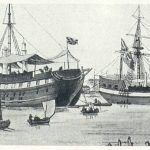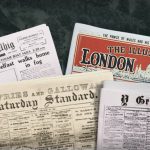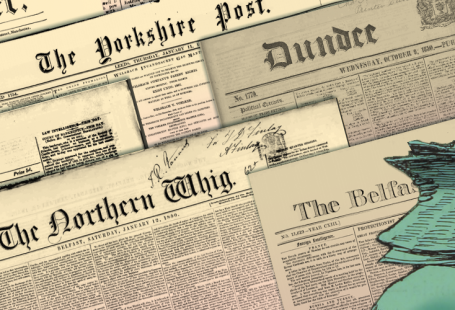This week at The Archive we are delighted to announce that we now have 42 million pages available to search, with our current total having hit 42,089,096 pages.
In this last week alone we have added 112,706 brand new pages, with seven brand new titles joining us from England and from Wales. In all, we have added 161 years’ worth of headlines. Read on to discover the treats we have in store for you – from new titles from the West Country, to a day in the life of novelist Thomas Hardy, from new Welsh titles to those that we have updated this week.
Register now and explore the Archive
First up and fresh from the West Country this week is the Bristol Observer. Established in 1859, this Liberal publication appeared every Saturday and cost one penny. Circulating in Bristol, Clifton, Bath, Gloucester, Cheltenham, Worcester, Swindon, Stroud, Wells, Exeter, Taunton, Cardiff and Swansea, as well as other towns in the west of England and the south of Wales, the Bristol Observer described itself as standing ‘at the head of the Weekly Press as the most extensively circulated Journal between London and Land’s End.’
Bristol Observer | 16 February 1898
With offices in Bristol, on Baldwin Street, and London, the Bristol Observer built its reputation around being a ‘Saturday penny paper with original tales.’ Indeed, in 1890 the Observer featured two novels by Arthur Conan Doyle in its pages.
Staying in the West Country now, but moving on to Dorset, we are delighted to present this week a trio of Dorset sister papers: the Blandford and Wimbourne Telegram, the Bridport, Beaminster, and Lyme Regis Telegram and the Poole Telegram.
The Blandford and Wimbourne Telegram first appeared in 1862, published in the historic market town of Blandford Forum, in the north east of Dorset. Meanwhile, its sister paper the Bridport, Beaminster, and Lyme Regis Telegram was first published in 1865 as an independent title in the rural market town of Bridport, in the west of the county.
Bridport, Beaminster and Lyme Regis Telegram | 16 January 1880
Describing itself as an ‘excellent advertising medium,’ the Bridport, Beaminster, and Lyme Regis Telegram contained correspondence, local news, such as the latest from the Town Council and the County Petty Sessions, as well as reports on social events like a fancy dress ball, and a list of those in attendance. Filling twelve pages, this title had a circulation of 600.
Rounding off our trio of Dorset telegrams is the Poole Telegram. Published in the town of Poole from 1879 and appearing every Friday, the Poole Telegram was Liberal in its politics. Within its twelve pages you could find news from across the county, as well as weather reports, church news, international news, and such sections as ‘Town Talk and Street Echoes,’ as well as tide tables for the town.
Poole Telegram | 6 February 1880
Eventually, these three Dorset titles were taken over in 1886 by the Western Chronicle, which was established in 1764 and was published in Yeovil, Somerset. The Western Chronicle had a large circulation in Somerset, Dorset, Wiltshire, Hampshire and East Devon.
We move now on to our two new Welsh titles of the week. Starting us off is the Llanelly Mercury, which was established in 1891. Appearing every week on a Thursday, this English language title circulated in the Carmarthenshire town of Llanelli and the rest of South Wales, and contained local and general news.
Our second Welsh title of the week is the Rhos Herald or the Herald Y Rhos. A weekly newspaper that circulated in the Ruabon and Rhosllanerchrugog areas of North Wales, the Rhos Herald was published between 1894 and 1966 with a focus on local news.
Founded by Richard Mills (1840-1903), who edited the paper until his death before passing control of the title on to his sons, the Rhos Herald was predominately printed in the English language but did contain some Welsh language articles. It contained such sections as ‘Other Men’s Minds,’ with quotes from a variety of sources, a ‘Thanks’ section, giving readers an opportunity to express their gratitude, as well as an extensive sport section, with a particular focus on football.
The Rhos Herald also published Welsh language poetry, and featured a range of illustrations and advertisements. Within its pages you could find ‘Useful Recipes,’ as well as an ‘In Memoriam ‘ section.
Rounding off our new titles of the week is Warwickshire publication the Atherstone News and Herald. Originally appearing as the Atherstone News and District Advertiser, this politically neutral publication first appeared in 1886 and was published every Friday, priced at half a penny.
The only newspaper to be printed and published in the North Warwickshire market town of Atherstone, it had a large circulation in the ‘surrounding district.’ Consisting of four pages in the early days, it contained such section as ‘Our London Letter,’ ‘Home Hints,’ ‘Dress of the Day,’ and ‘Readings for the Young.’ It also featured illustrations, international news, local news from the school boards, the parish council, the petty sessions and the courts. You could also find within its pages serialised fiction.
Atherstone News and Herald | 28 May 1897
Fast forward to the 1970s and the Atherstone News and Herald was still appearing every Friday – this time costing sixpence and comprising of 20 pages of predominately local news.
Meanwhile, we have updated sixteen of our existing titles. A particular update of note is the over 11,000 pages we have added to the Swindon Advertiser. Meanwhile we have also added new pages to one of our international titles the Indian Daily News, and you can find updates to publications from Halifax to Stockton, from Fulham to Bootle. Full details of all our new and updated titles can be found at the end of this blog.
At Home with Thomas Hardy
With three Victorian titles joining us this week from Dorset, we thought we’d take a look at how they reported on one of the county’s most celebrated sons, Thomas Hardy. Through his novels, such as Tess of the d’Ubervilles and Far From the Madding Crowd, Hardy immortialised his home county of Dorset as Wessex. And our newspapers give a fascinating glimpse into Hardy’s life and work, as well as the attitudes of local Dorset people towards this literary celebrity.
In July 1883, the Bridport, Beaminster, and Lyme Regis Telegram reports how ‘Mr. Thomas Hardy, [the] eminent novelist, and one who has brought great honour on his county, has taken up his residence’ in Dorchester. The pride in Hardy as a Dorset native is evident, and is reflected again in another article in the same newspaper in May 1884, which states how ‘Dorset has a right to claim Thomas Hardy as her own,’ congratulating him on his latest tale.
Dorchester | Illustrated London News | 1 October 1892
Around this time, work was being completed on Max Gate, which Thomas Hardy, himself a former architectural student, designed, and lived in from 1885 until his death in 1928. In February 1886, the Blandford and Wimbourne Telegram published a fascinating piece entitled ‘Mr. Thomas Hardy ‘At Home,” which gives wonderful insight into the daily life of the author.
The beginning of the article reads as if from the pen of the novelist himself:
Country folk who, shortly after sunrise, plod along the narrow lanes stretching to the east of Dorchester, have their eyes frequently attracted by a crimson spot high on a distant ridge of the landscape, and so intensely coloured in the early sunlight as almost to resemble a drop of blood…there are few who do not know it to be the residence of Mr. Thomas Hardy, the novelist, or, as they express it, ‘the man that makes up books about we.’
Max Gate | Illustrated London News | 1 October 1892
The article then takes us inside Max Gate, the residence that Hardy had designed, and we get to meet the author himself:
We enter the writing-room – a long apartment, solidly furnished, without a single article in it that is not required for use, our author’s indifference to things, as such, showing strongly here – and there rises from a writing-table to meet us a somewhat fair-complexioned man, a trifle below the middle height, of slight build, with a pleasant thoughtful face, exceptionally broad at the temples, and fringed by a beard trimmed after the Elizabethan manner; a man readily sociable and genial, but one whose mien conveys more of the tragedy than the comedy about it, and that he is disposed to rate life, and what it can give, at no very extravagant value.
Thomas Hardy | Illustrated London News | 1 October 1892
Tantalizingly, we are told that Hardy has been engaged in ‘revising the proof-sheets of his Graphic story, The Mayor of Casterbridge.’ We then learn about Hardy’s writing methods, and how ‘many chapters of his stories have been printed without revision, precisely as written down in the first heat of conception:’
When he has a story in hand, he begins writing immediately after breakfast, and remains indoors until he has finished for the day, even a very little time spent in the open air before beginning proving fatal to any work after nightfall. When not dictating, a practice he indulges in occasionally, but not frequently, he prefers working alone, holding, moreover, with his friend, Mr. Aubrey de Vere, that not only a solitary room, but an impregnable house, would be the most desirable place for complete literary performance.
Hardy certainly had an impregnable house in Max Gate!
Max Gate | Illustrated London News | 21 October 1967
Meanwhile, the author talked about how ‘his books are written with an eye to a masculine than to a feminine audience, and to middle-age women rather to girls in their teens,’ although he admits that:
Not infrequently, too, come letters from ladies, charging him with holding a rather low estimate of womankind in general, and with failing to appreciate the excellencies of the sex.
Although seeming rather aloof from such public opinion during this interview, this was of course before the publication of his final novel Jude the Obscure in 1895, the outrage towards which caused Hardy to concentrate solely on his poetry until his death in 1928.
Thomas Hardy at Max Gate | The Sphere | 21 January 1928
And being a local celebrity was not without some small drawbacks – Hardy could not keep everyone happy. At a meeting of the Dorchester Lecture Society in October 1884, where the subject at hand was ‘The Story of Corfe Castle,’ the Bridport, Beaminster, and Lyme Regis Telegram tells how one Mr. B. Fosset Lock expressed:
…a wish that their friend and neighbour, Mr. Thomas Hardy, would reproduce the Dorset of the 17th century, with Corfe Castle as its centre of interest, in a historical novel, as he had already treated the Dorset of the early part of the 19th century, the time of Nelson, with Weymouth as a centre of interest.
This work, Fosset Lock contended, would be ‘much greater than The Trumpet-Major,’ Hardy’s historical novel which was set during the Napoleonic wars.
Local celebrity and literary legend, praised and derided, our newspapers give a fascinating contemporary insight into the life, work and reception of Thomas Hardy. Discover more by searching our Archive’s pages today.
New Titles
Title | Years Added |
| Atherstone News and Herald | 1895-1910, 1913-1949, 1951-1982 |
| Blandford and Wimbourne Telegram | 1886 |
| Bridport, Beaminster, and Lyme Regis Telegram | 1880, 1882-1884 |
| Bristol Observer | 1877, 1879, 1886, 1889, 1898 |
| Llanelly Mercury | 1891-1892, 1894-1896, 1899-1908 |
| Poole Telegram | 1880 |
| Rhos Herald | 1922-1950 |
Updated Titles
This week we have updated sixteen of our existing titles.
You can learn more about each of the titles we add to every week by clicking on their names. On each paper’s title page, you can read a FREE sample issue, learn more about our current holdings, and our plans for digitisation.
Title | Years Added |
| Barrow Herald and Furness Advertiser | 1880 |
| Bootle Times | 1882, 1889, 1897 |
| Bridgend Chronicle, Cowbridge, Llantrisant, and Maesteg Advertiser | 1884 |
| Chester Courant | 1867 |
| Daily Record | 1905 |
| Fulham Chronicle | 1905-1906, 1979-1980 |
| Halifax Comet | 1893, 1898-1901, 1904 |
| Indian Daily News | 1898 |
| Reynolds’s Newspaper | 1933 |
| Saint James’s Chronicle | 1821 |
| Stockton Herald, South Durham and Cleveland Advertiser | 1880, 1882-1889, 1891-1892 |
| Sun & Central Press | 1871, 1873-1874 |
| Sun (London) | 1873-1875 |
| Swindon Advertiser | 1899, 1901-1910, 1912 |
| Swindon Advertiser and North Wilts Chronicle | 1911 |
| Widnes Examiner | 1889 |
You can keep up to date with all the latest additions by visiting the recently added page. You can even look ahead to see what we’re going to add tomorrow.

















